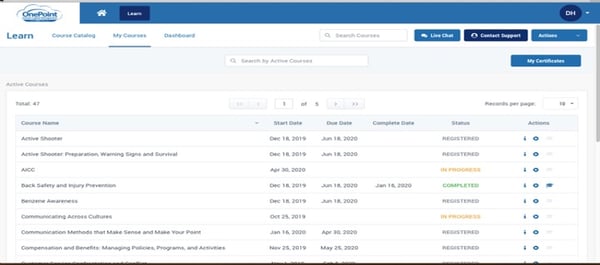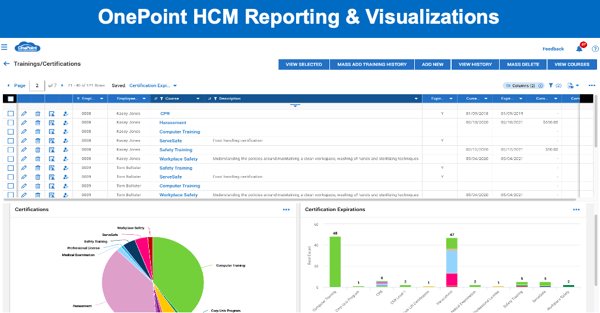The Time is Now for HR to Build an Employee Training Strategy

OnePoint’s LMS (Learning Management System) capabilities not only make it easier to build a comprehensive training strategy, but also keep your organization on top of new trainings and build employee engagement.
What Does an LMS Provide?
A learning management system is a software technology that serves as a repository to hold, deliver and track training. There are many kinds of LMS on the market, and some integrated into HCM platforms such as OnePoint’s LMS, but they all provide the same base functions: training and evaluating. These learning management systems are used in a wide range of industries- even in schools for online education. Their use within HR makes it easy to keep HR aware of licensure, certifications, and up to date for employee training.
Essentially, an LMS is a system to organize & present the training content. This includes the training modules, testing/assessment, and tracking and reporting capabilities. These systems are very helpful but are usually yet another HR technology and another login for employees. To make all this easier, OnePoint has integrated the LMS software and an extensive course catalog directly into our HCM platform. Now you can create training profiles, assign training tracks in OnePoint. Employees can take assigned training through the single self-service portal.
Advantages of OnePoint’s LMS
Organizations create employee training programs to meet compliance requirements and to provide professional development opportunities for their employees. When appropriately used, learning management systems organize and group content into training tracks and streamlines the employee training process.
OnePoint’s LMS solves a number of challenges HR face when building an employee training strategy.
Where do I get Content?
The biggest challenge launching a comprehensive employee training program is simply the content. What training do you need, want where to get it and cost. OnePoint Learn is unique because the subscription includes a library of over 300 courses available with the platforms. HR teams can simply subscribe and have hundreds of courses at their fingertips to create training programs to meet both compliance and safety training. Other categories include management, leadership, IT security as well as soft skill and professional development content. A new set of courses for pandemic awareness and safety was just released, further demonstrating the advantage of an LMS with turn-key courses built in.
Simplify Delivery
Another challenge with ad hoc training programs is the delivery. Having to distribute yet another vendors, another system password, deal with employee login and system issues. OnePoint Learn solves this by integrating into the OnePoint HCM Suite. Your employees simply login to self service and can see the training they need to complete. This means your remote employees can engage the same as employees in the office. They can see progress and completion status. HR can manage training profiles, and push reminders to employees. Reporting is centralized streamlining the communication and tracking for your training programs.

Centralize Reporting
Another considerable advantage of a learning management system is tracking and reporting. HR administrators can review a real-time dashboard for each employee to see assigned trainings, with progress and completion dates. These analytics tools make it easy to remind employees to complete training and have reports showing that required training has been completed.

If You’re Not Using Your LMS Now, You’re Missing Out
With our sudden shift to online collaboration and working from home, companies need flexible technology more than ever now. And now is the time to focus on an employee training strategy focused on skill-building and technological integration. As employees continue to work remotely, have increased downtime, and slower business operations, employers should promote LMS courses and the educational opportunities available to them to their employees. By using the system, they could retrain relevancy in certain areas, get certified in new areas, reinforce learning, and engage other employees with the LMS to benefit overall company operations.
Subscribe to updates
Get the latest posts delivered to your inbox.